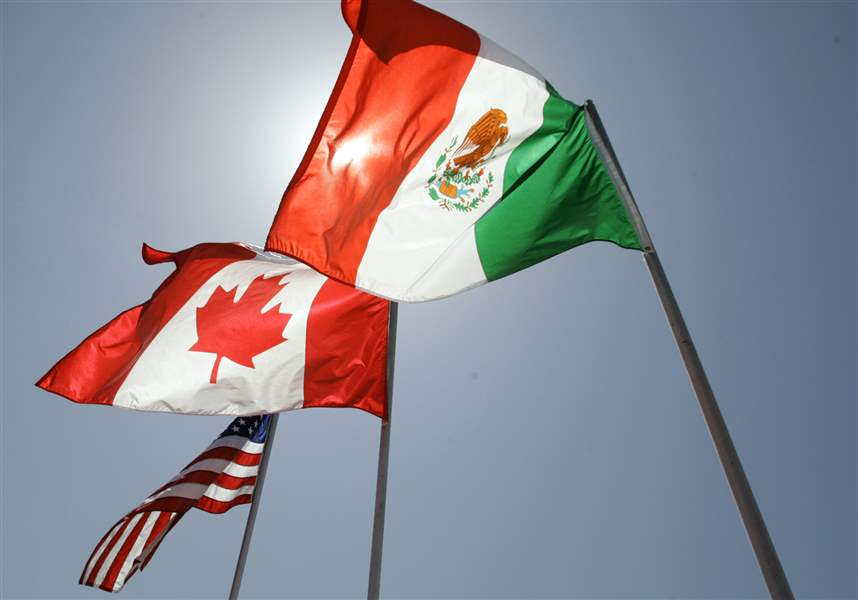
As NAFTA goes, so goes the nation
5/10/2018
The United States, Canada, and Mexico have engaged in a series of talks surrounding a re-negotiation of NAFTA.
ASSOCIATED PRESS

Lessenberry
DETROIT — Whatever happened to the negotiations aimed at reworking NAFTA, the controversial North American Free Trade Agreement that many blame for the loss of U.S. manufacturing jobs?
The answer is that representatives of all three countries are still negotiating furiously, and if an agreement is possible, we will likely know in the next few weeks.
Read last week’s column by Jack Lessenberry
But while NAFTA may be widely unpopular, if they fail to save it, economists say the result may well be devastating for America, and the automotive industry most of all.
When President Trump was campaigning, he promised to pull the country out of the three-way consortium with Canada and Mexico. After he was elected, he thought better of that, and decided to try to renegotiate it instead. Late last year, a long series of talks began, with trade negotiators shuttling back and forth between Washington, Ottawa, and Mexico City.
The goal was to get an “agreement in principle” by April 30, but that deadline came and went. Douglas George, a highly experienced trade negotiator who is now Canada’s consul general in Detroit, is still hopeful. “Intensive negotiations continue,” he told me last week.
The eighth and latest round began in Washington Monday, with U.S. Trade Representative Robert Lighthizer joining his counterparts from Mexico and Ottawa. Although the principal figures meet only sporadically, lower-level negotiations on various aspects of the enormously complex agreement go on pretty much all the time.
NAFTA is not popular in the industrial heartland, perhaps especially in Toledo and Detroit, where it is blamed for lost manufacturing jobs. Dan Ujczo, a lawyer from Columbus, who specializes in international trade, quipped recently that “I seldom hear NAFTA mentioned without another word starting with F in front of it.”
But the fact is that were the United States to pull out of NAFTA, it would be devastating for the economies of all three nations.
Apparently realizing that, Mr. Trump chose to renegotiate it, but insisted on radically revised “rules of origin” that would require that at least half of the components in every car in all three countries be manufactured in the United States. That demand seemed especially popular in Michigan, Ohio, Pennsylvania, and Wisconsin, the heavy manufacturing states that gave Mr. Trump his upset victory.
However, a new study shows that were the President to get his way on “rules of origin,” it would actually be disastrous.
The Ann Arbor-based Center for Automotive Research (CAR) recently published a detailed review of current NAFTA proposals and potential impacts on the North American Automotive Industry.
Led by Kristin Dziczek, the group’s vice president of Industry, Labor and Economics, they found that “the current U.S. proposal would disrupt the market,” and make American cars more expensive.
What’s worse, insisting on unrealistic rules of origin would also hurt sales, they found; if the cost of meeting them gets too tough, “then production will move outside North American to lower-cost regions.”
That means even more jobs lost. Mr. Trump was also originally insisting that 85 percent of parts in all vehicles originate in one of the three NAFTA countries, something experts called unrealistic.
Lately, however, Washington has been showing some “creativity” in regards to rules of origin and in other areas, Mr. George said.
Nobody claims that NAFTA, which was signed in 1994, was ever a perfect agreement, or one that was going to please everybody. Ironically, while it almost certainly would not have been renegotiated had Hillary Clinton had won the election, in some ways it needed to be.
“There are all sorts of rules about the standards for cassette tape players in cars, which are no longer manufactured, and nothing about the digital economy, which didn’t exist in 1994,” Mr. George said.
KEITH BURRIS: Can economic nationalism work?
There’s long been wide disagreement on NAFTA’s impact. President Trump claimed during the campaign that it had resulted in the loss of 6 million mainly manufacturing jobs.
But neutral economists think the vast majority of those would have been gone anyway; too often, people blame NAFTA for job losses caused by globalization. Robert Lawrence, a professor of government at Harvard, calculated last year that the total number of jobs lost because of NAFTA was something less than 150,000.
However, other jobs have been created by the trade agreement. Overall, NAFTA has had a “modest but positive effect,” on the entire U.S. economy, according to a recent analysis by the Council on Foreign Relations. The bottom line, is that NAFTA helped the domestic auto industry survive by creating a relatively seamless three-nation manufacturing and production network.
Tearing it apart now would result in an epic disaster, the CAR study found. Not only is the U.S. auto industry heavily dependent on trade, it couldn’t possibly keep up with even domestic demand. Last year, Americans bought 17.3 million cars and light trucks; our factories made 11 million. “The U.S. cannot self-supply,” it concluded.
But an agreement probably needs to come quickly for political reasons. Mexico has national elections July 1, and President Trump also wants this wrapped up well before our November elections.
One final sticking point may be Washington’s initial demand that the treaty have to be renewed every five years. Mexico and Canada argue that businessmen need stability, and agreeing to review the treaty at regular intervals instead makes more sense.
Other stories may seem flashier. But what happens in the next few weeks with NAFTA may be far more crucial to our economic futures that Stormy Daniels ever could be.
Jack Lessenberry is the head of the journalism faculty at Wayne State University in Detroit and a former national editor of The Blade.